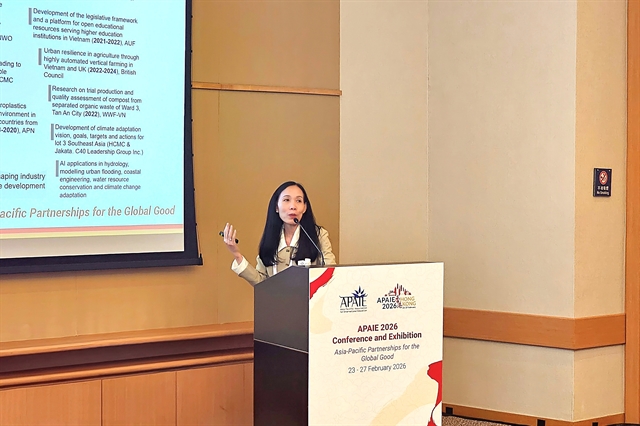 Life & Style
Life & Style

 |
| American mental health counselor Douglas Holwerda. — Photo Courtesy of Family Medical Practice Vietnam |
By Douglas Holwerda*
Most often when people think of mental health problems, they think of depression or anxiety or something more serious, like schizophrenia. But there are other patterns of thinking that can cause inner turmoil or unhappiness. One of these is perfectionism. It is an internal system that often starts out as a mindset to inspire success, but which can lead to chronic feelings of failure and frustration.
Most of us are taught that having goals, high standards and lofty expectations is a good thing. These habits can motivate ourselves, and others, to strive toward a particular desirable outcome. When we are able to will ourselves to achieve our goals we feel a sense of accomplishment, which might be called efficacy: the ability to make a plan and carry it out. Goals give us targets to shoot for and help us place our everyday efforts in the broader context of our striving towards the future. Our goals might be in line with our values and ideals. They might reflect what could be our perfect or ideal self. It might be difficult to see what can go wrong with this kind of thinking.
Our goals and ideals always exist in the hypothetical realm, in what we can imagine. They can become the dream that exists in the cloud of what is possible. And while they may serve as a source of inspiration and motivation, they can also be beyond our reach. How we react when our dreams are unattainable determines whether positive ambition has become unhealthy perfectionism.
Perfectionists start to believe that what they expect of themselves is always possible and that failure to attain their goals is a failure of the will. While there is value in determination and increasing efforts to meet new challenges, it is a recipe for frustration, anxiety and a sense of failure. When we expect ourselves to be perfect we will inevitably fail. It is common for a perfectionist who accomplishes a goal to devalue that accomplishment while raising the standard for the next goal. They start to chase higher goals, but feel that nothing is enough.
It is not uncommon for high-functioning people to come to see me at a time when they have faced a challenge that is beyond their ability. They have experienced frustration, anger and anxiety, while feeling like their lives are “out of control”. The only method they have employed is to try harder, to double their efforts, which only serves to frustrate them more.
Perfectionists are desperate to feel “in control”. They tend to think in terms of either/or, all-or-nothing. While they have accrued a lot of evidence that holding oneself to high standards works, they have not fully embraced the truth that they are human and can never be perfect. They have forgotten or never learned that we cannot live up to what we can imagine ourselves to be. We have to get grounded in reality and discover what is realistic.
The important step in the process of grounding ourselves is to figure out the line between what is and what is not inside our control. When we realize those limitations we can let go of unrealistic expectations. Secondary control is the way that we let go of what is unrealistic and release ourselves from the frustration, anger, anxiety and all the self-judgment that we heap on ourselves for “failing”.
It is important to note that this is a system that is often learned. Parents can hold expectations for their children to set goals and to work hard to achieve them—surely a positive and nurturing attitude. But they can inadvertently send the message that the child’s value and worth are connected to their performance. Performance becomes part of a child’s identity and can catch them in the trap of perfectionism.
Recently I met with a 16 year-old student who was thinking of suicide. She said that she had always been an excellent student, attaining all “A’s”, but now she is finding it difficult to achieve these grades, no matter how hard she tries. The more she feels like she is failing and disappointing her family, who want her to study abroad, the more depressed she gets. This is a downward spiral, one she does not know how to stop. It is clear from the outside that her expectations and ideal self are not in line with what she is currently able to do. Acceptance of that truth is necessary for her to release herself from the stress she is under. Her identity is too linked to her performance and to goals that are possibilities, but should not be expectations. Parents can help in situations like this by rewarding effort and accepting the outcome, whatever it might be.
Being realistic, rather than perfectionistic, we factor in many variables that might not be considered in our hypothetical expectation. We encounter obstacles outside ourselves and emotional challenges inside ourselves. With empathy, compassion and acceptance we improve the likeliness of our own success, and can learn to feel good about our hard work and dedication, whatever outcome it may produce. — Family Medical Practice Vietnam
Douglas Holwerda is an American mental health counselor working at Family Medical Practice Hanoi. He works with teens, adults and couples to resolve such issues as anger, anxiety (including panic attacks and OCD), depression (including suicidality), relationship and communication problems, expat adjustment, loss and grief, mid-life changes, and meaning of life questions. He also works with those seeking personal growth and help with other mental health concerns.
For more advice on any medical topics, visit Family Medical Practice Hanoi on 298 I Kim Mã, Ba Đình or call (024) 3843 0748. Email: hanoi@vietnammedicalpractice.com or check out www.vietnammedicalpractice.com
FMP’s downtown HCM City location is at Diamond Plaza, 34 Lê Duẩn, District 1; Other facilities are at: 95 Thảo Điền Street, District 2. Tel: (028) 38227848. E:hcmc@vietnammedicalpractice.com
FMP Danang is located at 96-98 Nguyễn Văn Linh Street, Hải Châu District, Đà Nẵng. Tel: (0236) 3582 699. E: danang@vietnammedicalpractice.com.




